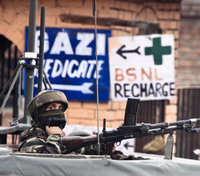India has vehemently opposed the imposition of a no-fly zone in strife-torn Libya. Though New Delhi supported U.N. Security Council Resolution 1970, authorizing ecomonic sanctions against Col. Moammar Gadhafi and referring Libya to the International Criminal Court, India has made it clear that it stands against any kind of military intervention in the troubled state.
However, New Delhi's aversion to intervention is far from consistent: When it comes to South Asia, in particular, intervention in the internal matters of other states has long been part and parcel of India's foreign policy. In 1971, India fought a war with Pakistan and liberated Bangladesh. It sent a peacekeeping force to strife-torn Sri Lanka in 1987. Maoists in Nepal blame their political misfortunes on India's interventionist policies there, and Bhutan exists as a virtual Indian protectorate.
Three other factors further complicate the picture. First, unlike during the Cold War, India no longer locates itself at the fringes of international politics. Today, it seeks its rightful place at the heart of the global order, based on its meteoric rise over the past few decades. By consequence, the old tropes of anti-imperialism and third-world solidarity do not figure in India's contemporary foreign policy rhetoric. Second, unlike China, India bases its claim to global prominence not only on its increased economic power, but also on its respect for the rules and norms of appropriate global conduct. Finally, India is a democracy and has much in common with the values and ethics of Western nations. The rule of law and fundamental rights constitute the basic edifice of the Indian state.

